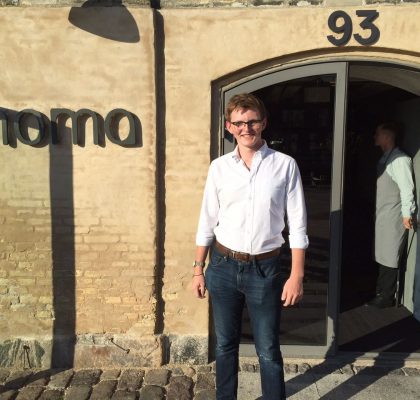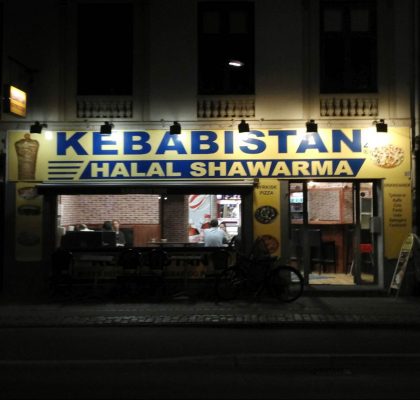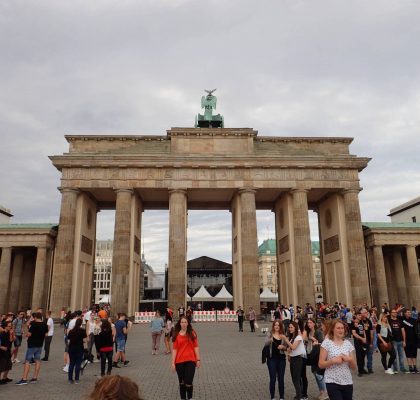I got off the bus to Pamukkale after a restless nights’ sleep, and was greeted by a massive wall of blinding white. It reflected the rising sun, looking like a salt lake’s tidal wave frozen in mid-crash. In reality, Pamukkale is a series of built-up calcium deposits, and mineral the local spring water is unusually rich in.
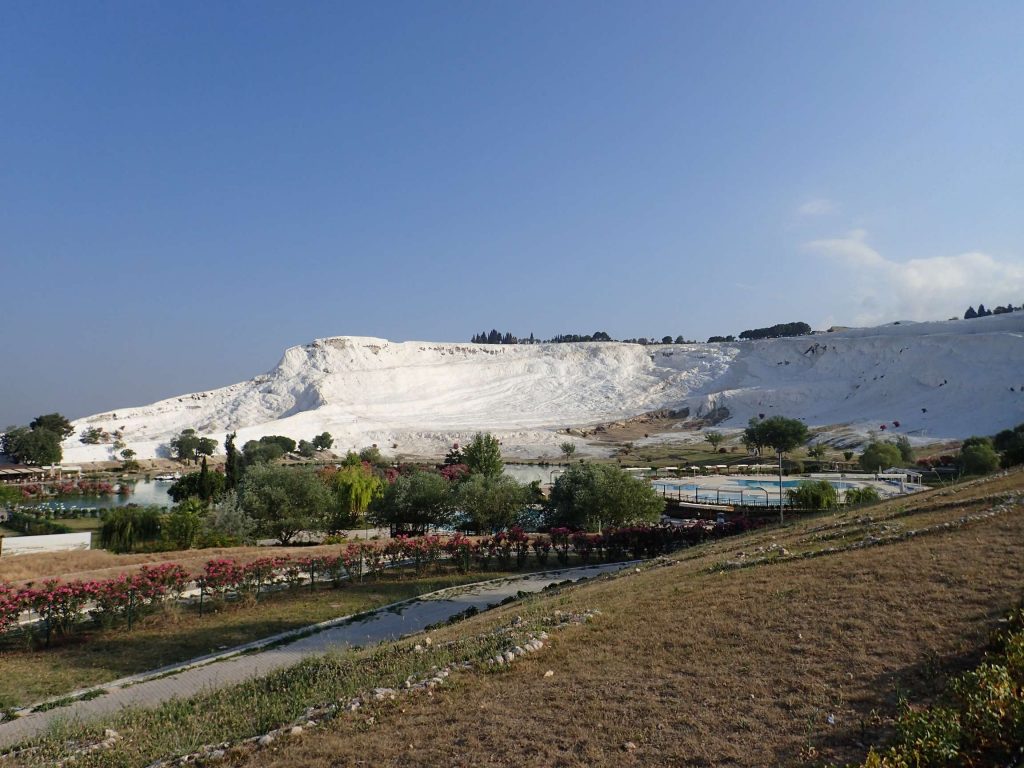
Pamukkale literally means ‘cotton castle’, and walking up its face barefoot you can see why. The calcium forms waves and ripples underneath your feet, even though it feels like sandstone. Stepping inside the sporadic pools of water sends plumes of calcium powder shooting up around your foot.
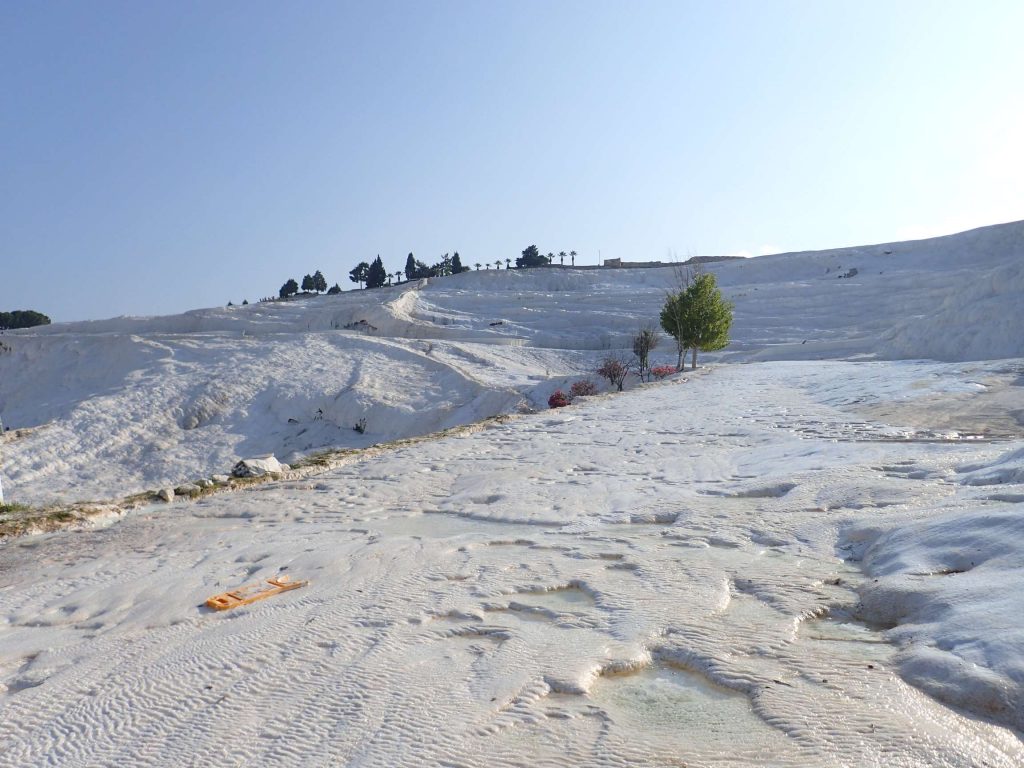
Water trickles down uniformly over the path, the culprit for the formations on the ground. Off to one side, barred from entry, the natural travertines (pools) of water sit, rising out of one another, formed by many years of flowing water. Back in 70s and 80s, you could apparently walk in these, but they were quickly broken and ruined by tourism. A new area for tourists was created with artificial pools and water flow, and the original pools have now regenerated.
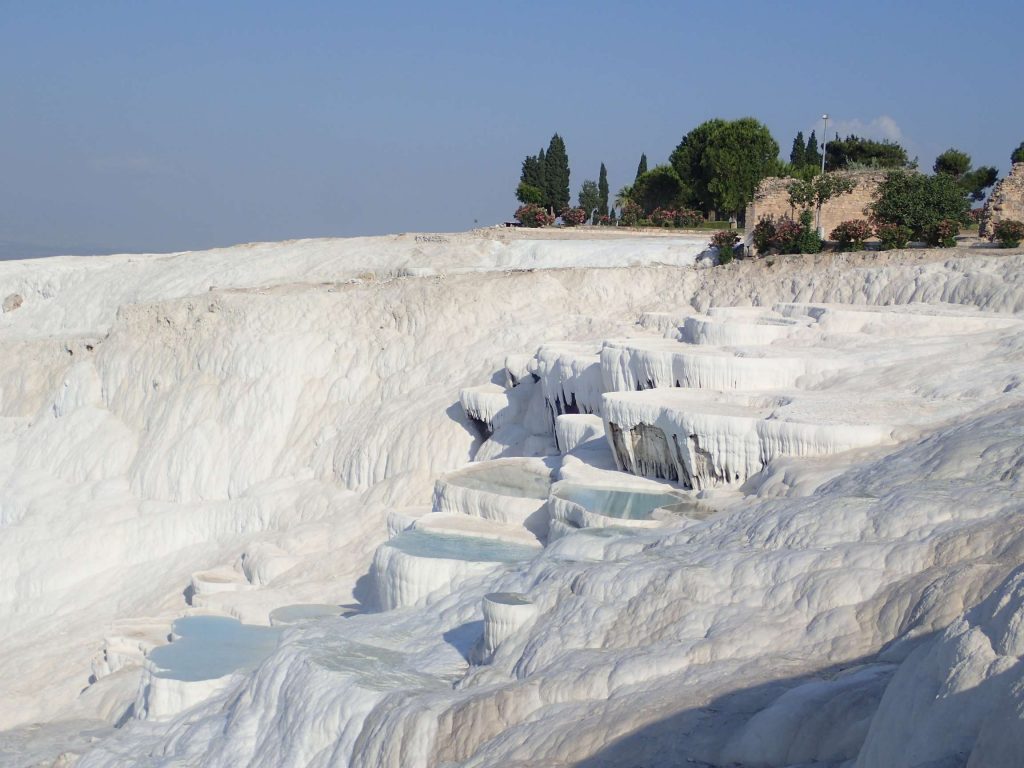
I was through the gates as soon as they opened, coming up from the lower entrance. I could see only one other person as I came up the face of the small hill, still in shadow from the sun. Once I reached the top, though, I was met by hordes of barefoot Chinese tourists wading cautiously into the ankle-deep water. As I would later find out, the Eastern Europeans come when the sun is higher and clog the pools, draping their bikinied selves over every available space to get that perfect selfie.
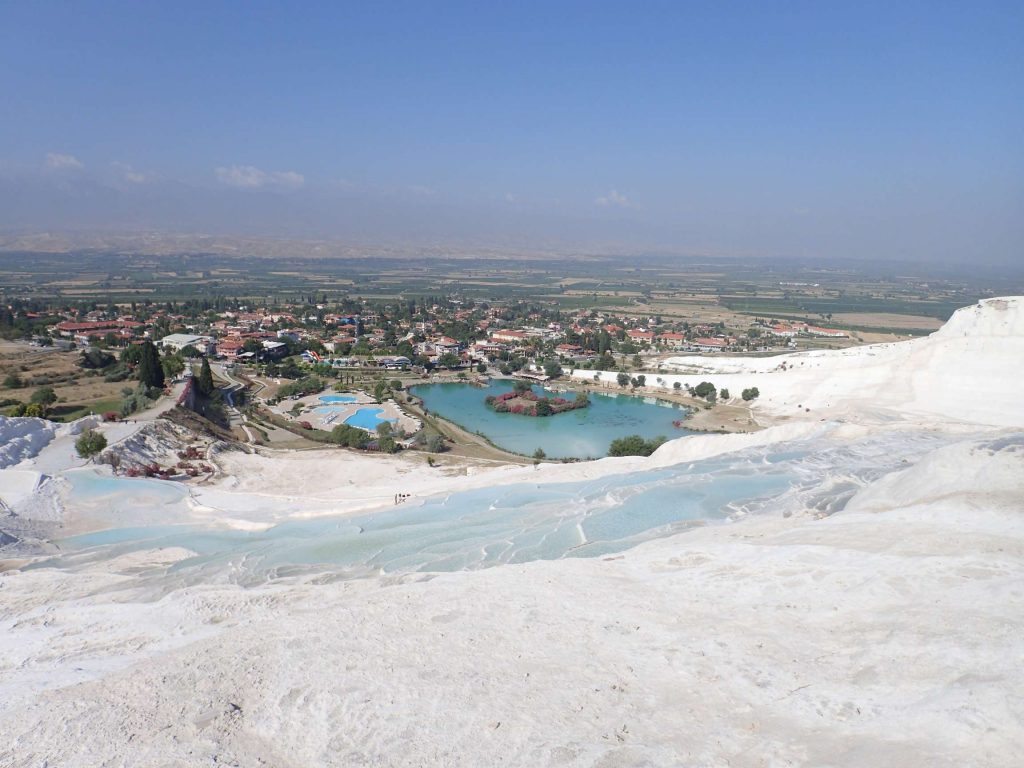
On top of the plateau lies the ruins of Hierapolis, an ancient city. The crumbling pillars and houses lie around buzzing insects and spiky grass. The main and best-preserved attraction is the theatre, which is still in excellent condition.
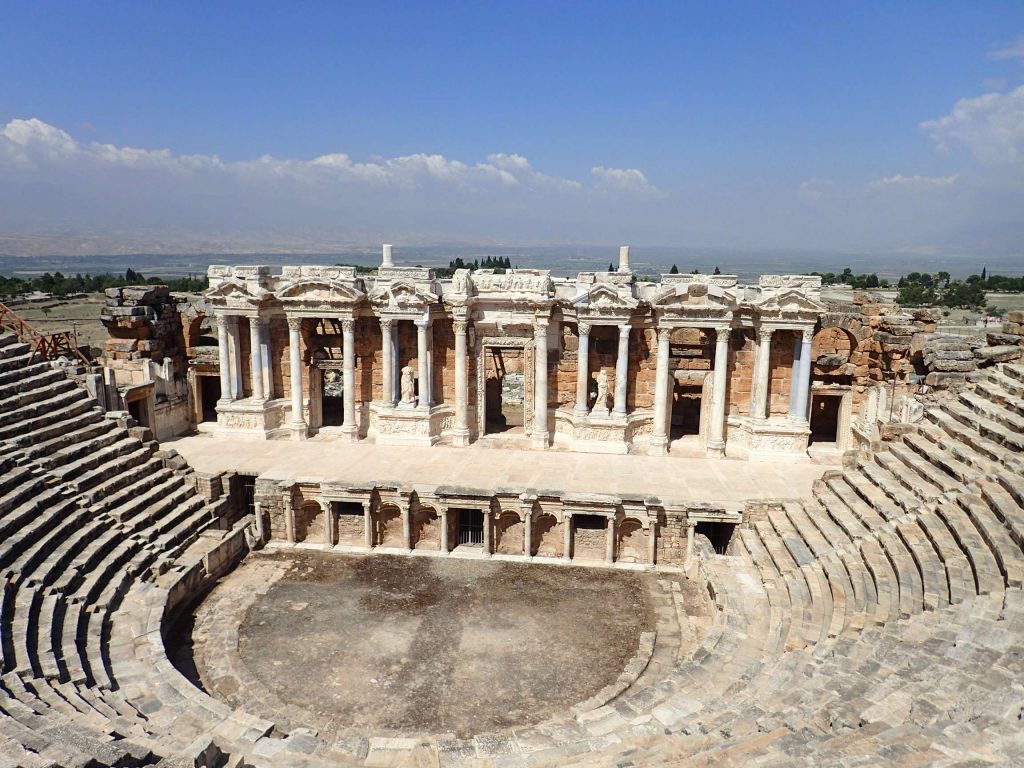
The ruins are impressive, and I spent a few hours just walking and sitting around them. Having entered Pamukkale at 8am, by noon I was on the minibus to Denizli and standing roadside with a sign saying “FETHIYE”. I was recommended a ‘hippie beach camp’ called Kabak, an hour south of Fethiye, by my Austrian friend. Ten minutes later, I had a ride.
The driver was an Iranian engineer heading to Antalya for a ‘party weekend’. He said he was an Uber driver here in Turkey because there were no jobs in Iran. Driving along, he pretty much force-fed me the (excellent) cherries and peaches he had stashed between the seats as he blasted Turk-pop uncomfortably loudly. After an uneventful ride, he dropped me about 100km from Fethiye at an intersection somewhere. I was getting my bag when he said “Give me money.” – a few seconds of silence – “What?” – “Give me money.” I didn’t really know how to react. He said he wanted 20 lira (the cost of a Denizli – Fethiye bus ride…) because he was apparently ‘working as a taxi driver’ – despite there 1. having been no mention of payment and 2. him driving this route regardless of where I was going. I said no, he raised his voice and again asked for money – this time 15 lira. This continued until I reached into my pocket and pulled out some loose change – probably around 2 lira – which he refused, asking for more. I gave him 5 lira, which was a fair price for the fruit I had eaten. He hesitated, then took it. Then he said “pennies”, asking for the coins – at this point, I laughed and walked away. He drove off. I could have walked away earlier, and I would have, had I not eaten the fruit. Writing this a few days in the future and after several more rides, it’s ironic that the one sour hitchhiking experience I had in Turkey was with a non-Turk (of course, I’ve heard Iranians are famously hospitable too – it was more a symptom of ‘being a dick’, which has no cultural boundaries).
A hundred metres down the road with my sign out once again, I found myself surrounded by gum trees. As in China and Russia when I saw the same trees, I got the same strange sense of nostalgia from the smell of the Eucalypts. The familiar scent brought me back to the outback, to parks at home, to camping with my family or climbing trees with friends.
Within three minutes a black BMW had stopped. The driver was an Oculus Rift (a virtual reality headset) salesman who used to live in Fethiye. He said there was enormous demand for it in Turkey, but tight import regulations meant it was hard to find in-country. So his friend in Germany bought them there and sent them to him, where he bundled them with custom-built PCs and sold them for a very tidy profit. He drove fast yet cautiously, and he dropped me outside the bus station from where I could go to Kabak thirty minutes earlier than I expected. I thanked him for the ride, he grinned and said “Don’t forget me!” We never did exchange names. Quite a contrast to my previous ride.
Arriving in Fethiye was like crossing an invisible line. The sun was still two hours from setting, but food shops were open: the smells of kebabs and grilling meat wafted into the busy streets, foreigners and locals alike sat outside drinking tea and smoking cigarettes. Turkish and English could be heard in equal measure. The brightly-coloured buildings seemed alive in the late afternoon sun as people went about their day, buying groceries or just relaxing with a beer. This was it, I had arrived in ‘the West’ – the West of Turkey, but also culturally, with a tourism industry and more moderate religion. I caught the last minibus to Kabak, on the way passing Ölüdeniz beach, supposedly Turkey’s most beautiful. We circled round the bay on a rising switchback road and the Mediterranean spread out beneath us, legions of white reclining beach chairs with matching red umbrellas arranged on the beach. Above, paragliders sailed through the air every few minutes, floating down towards the sand. Discounting the Black Sea in Georgia, this was the first ocean I had seen since Vietnam, some 50 days and 15,000km ago. After an hour of twisting and turning and stunning vistas of the Mediterannean coast we finally arrived at Kabak – which is literally at the end of the road – it just runs into a cliff and stops. Kabak proper is down in the valley, a solid 25 minute trek down to the beach and the camps.
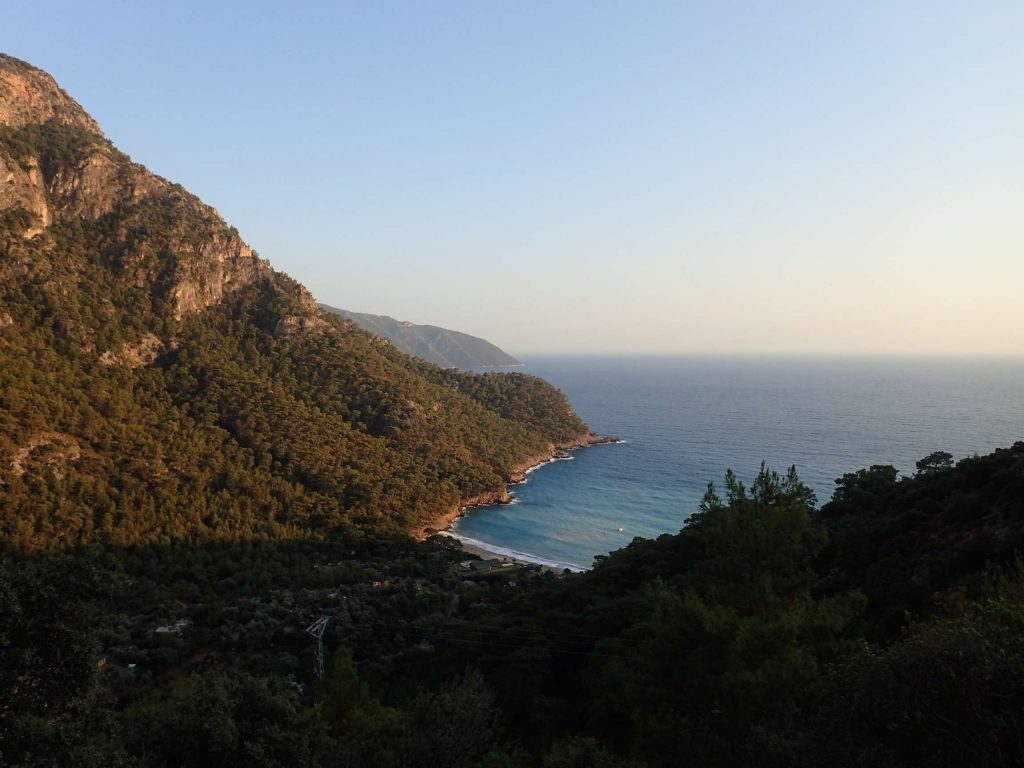
As I descend in flip-flops with my pack, the chorus of insects mixes with the salt air and the scent of crushed pine needles to create a heady mixture that screams ‘seaside’. The whole Mediterranean sensory experience is exactly how I imagined it all those years ago sitting in history class in middle school, daydreaming about ancient civilizations. Kabak is so far removed and relatively inaccessible, it gives the feeling that you come here to run away from something, or to not be found for a very long time. The kind of place where you accidentally stay for six months – or longer…
Down in the valley near the beach, rocks and dense trees are replaced by tattooed, pierced hippies wandering around. Painted signs nailed to trees advertise various campgrounds and reggae music almost universally floats through the air. Nobody seems to care what day it is or what the time is, much less about anything outside of the valley. I choose a particularly hippie-looking camp about two hundred metres from the beach. It’s surprisingly expensive, 65 lira/30AUD/night using one of their tents, but it includes buffet breakfast and dinner. From my brief search, this is common across all the camps – everyone decided it was easier than worrying about food for each meal, apparently.
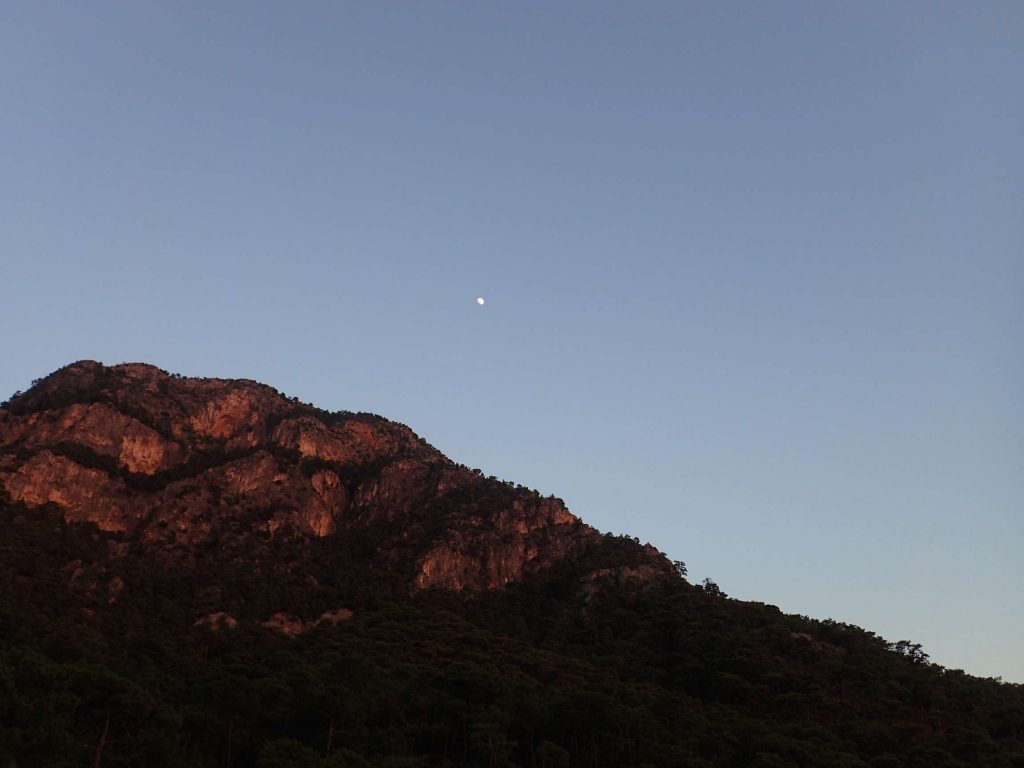
Looking around at the people lazing around, reading or napping or listening music, I have by far the least hair of anyone – well, except for the one or two I spot sporting a recently shaved head. Dreadlocks, messy buns, belly-button-length locks, or just ‘lots of hair’ are far more popular. This seems to be a ‘boutique’ hippie place – as in, everyone looks alternative enough, covered in tattoos and unique hairstyles, but I don’t think it’s quite true to the ‘beach bum spirit’. Moderately expensive beer, catered meals, fast WiFi. Many of the people I talk to are Turks from Istanbul or Ankara with well-paying jobs who are escaping for a few days, a week, sometimes indefinitely. I guess the hippie lifestyle is in vogue now anyway.
One evening I met a graphic novelist who called himself Fred who had two books published back in Istanbul. He said he was out here to be inspired for his next novel – a prehistoric story about the earliest humans. He could have been a character in a Wes Anderson movie; everything he said was strangely poetic – and yet not. Another was an electrical engineer from Ankara here to relax for just two nights. Another still was just a group of guys from Istanbul come to escape for the weekend – they were decked out with selfie sticks and trendy tattoos.
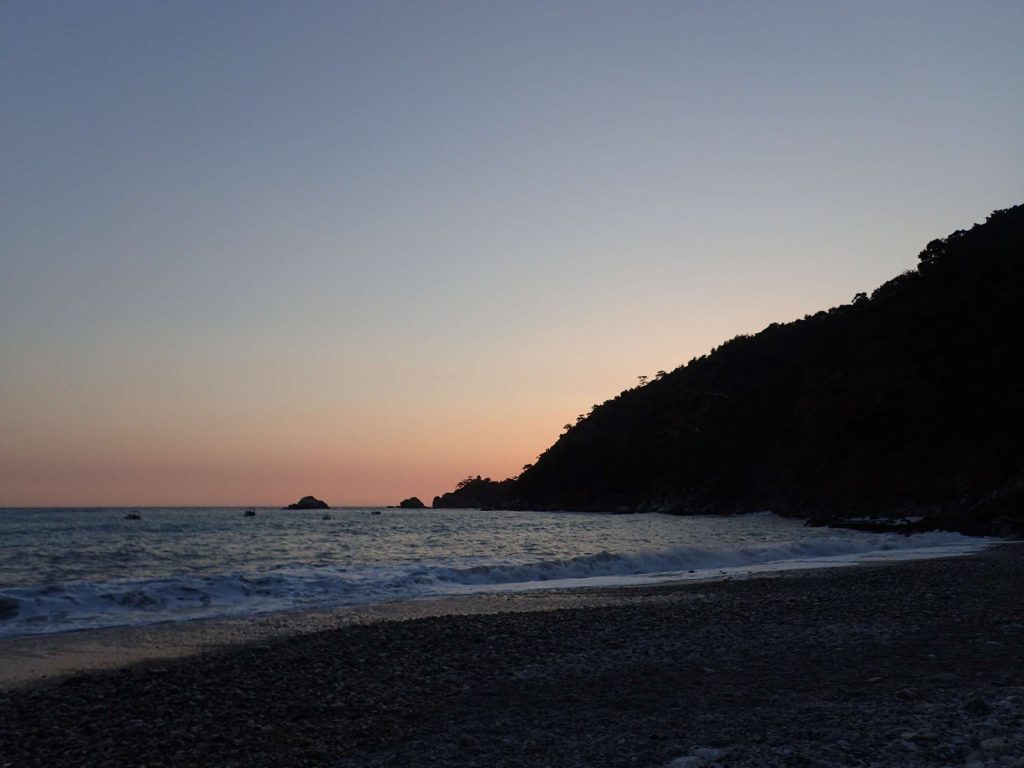
The camp was structured (and I use that word loosely) haphazardly, with hammocks strung between available trees, beanbags and large pillows strewn about, a couple of fire pits here and there, and tents placed wherever people wanted. The whole place was very relaxing – despite the amenities, it successfully captured the beach bum vibes. A lovely place to watch the hours pass alarming quickly and the sun sink into the sea with such ease it leaves you thinking “Uh-oh, what day is it?” As night falls, fairy lights wrapped around and between trees come to life, a large fire is lit, people congregate to the main areas. Thousands of white pinpricks appear above, crowned by an enormous glowing moon which floats across the sky, the only reminder of time passing. Some talk in low voices and sip beers, others just gaze into the embers – but many make their way to the beach where someone invariably has speakers and liquor, and the night continues to people stamping the sand under the starry sky.
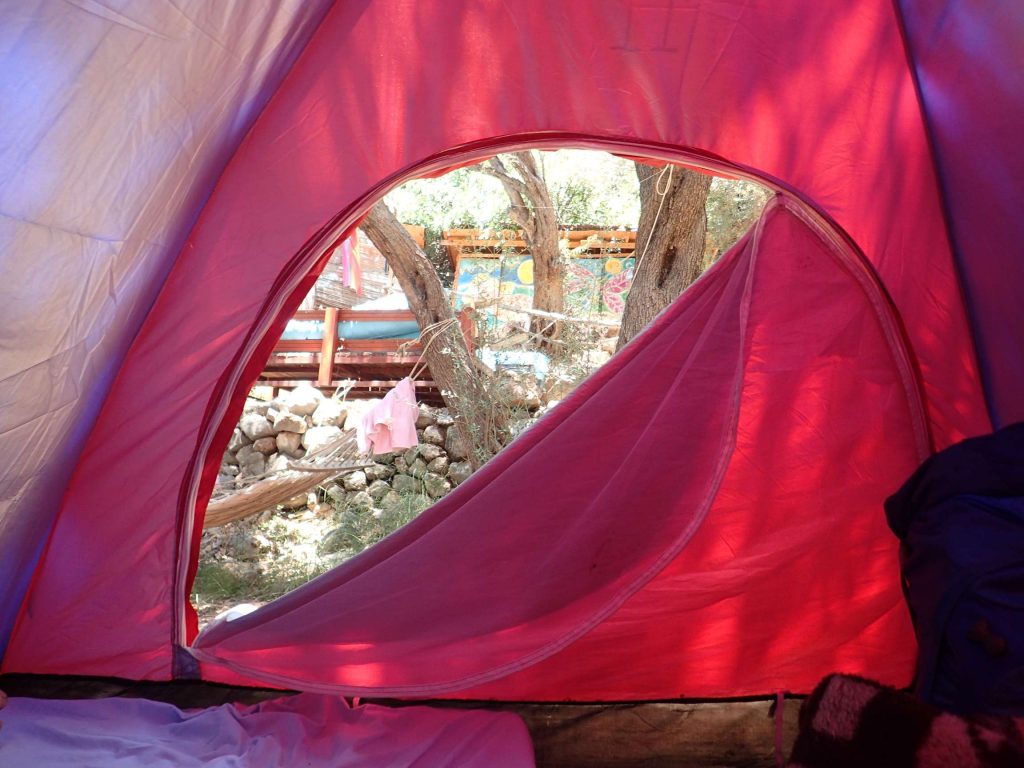
The next morning I made my way to the eating area, where the resident chef served up a Turkish buffet. He was named Uktu, and had a rudimentary grasp of English but a wide smile and long black hair pulled back in a ponytail. He would cook shirtless, his bulging torso moving surprisingly quickly as he served the procession of plates. His absolute favourite musician was Michael Jackson, a fact I noticed from his yodeled renditions of ‘Beat It’ and shuffling moonwalk.
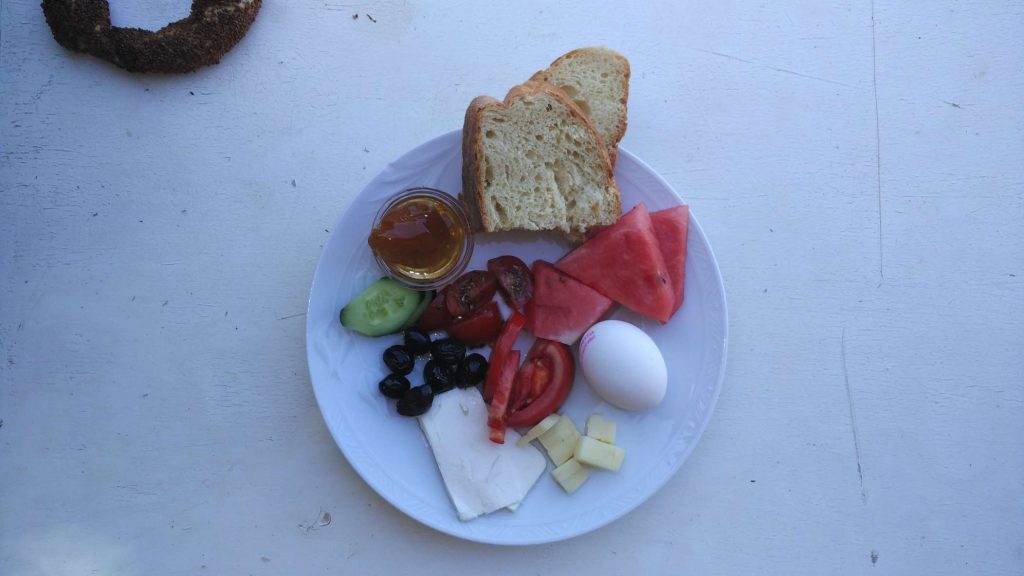
As the day heated up, I took a hike to find a supposed cave some distance away. Slipping and sliding along the steep forested mountainside – again in flip-flops – the path would vanish then reappear, seemingly without pattern. After sweatily bumbling around for the better part of an hour I met a Turkish medical student, equally lost, and we went looking together.
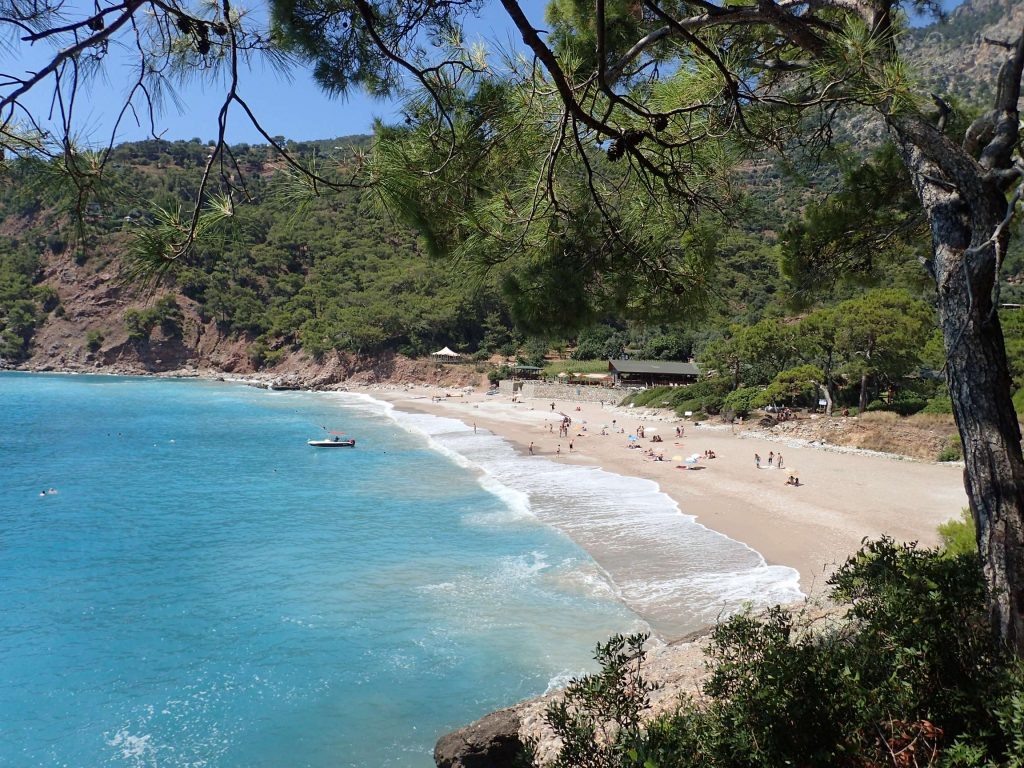
We eventually realized we had walked about 80% too far, as we backtracked and noticed that the trail veered off straight down to the sea less than two kilometres from the beach. Oops. We plunged into the Mediterranean, the warm sea washing off the afternoon’s navigational failures. I had forgotten how refreshing the ocean was. The cave was a jagged opening in the cliff face with an undersea tunnel and a small above-ground opening. A few people lounged on the spit of rock separating the inside of the cave from the rest of the ocean.
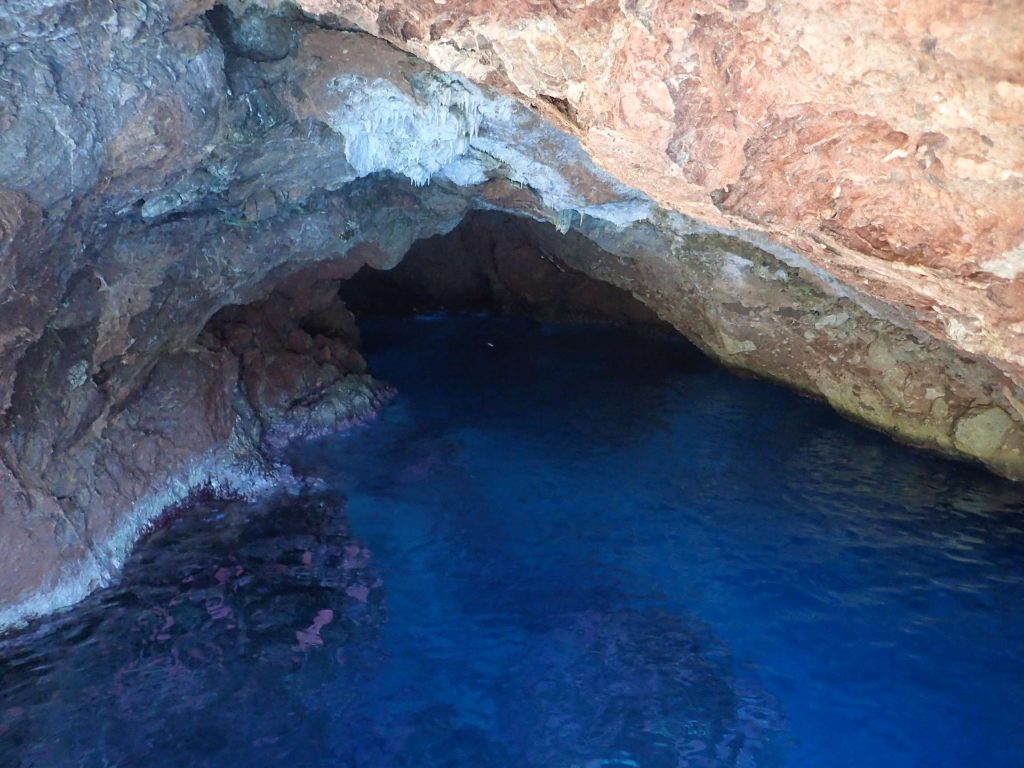
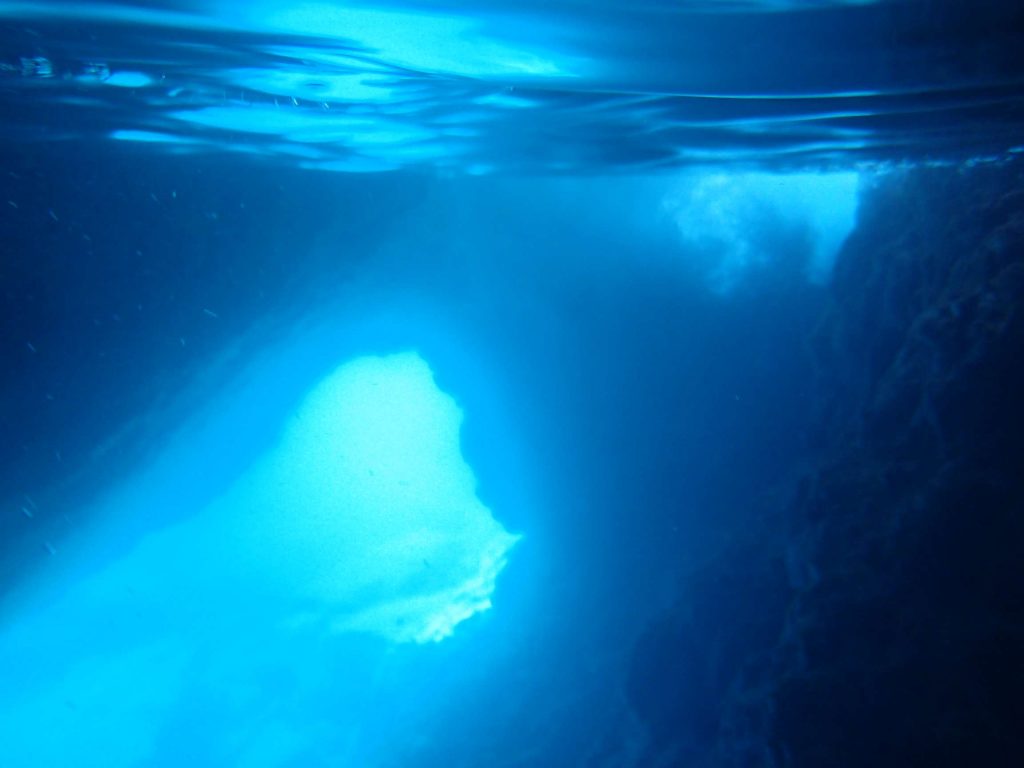
Inside the cave, the water was noticeably colder, and smelled more strongly of salt and ocean. Some swam through the tunnel; I decided against it.
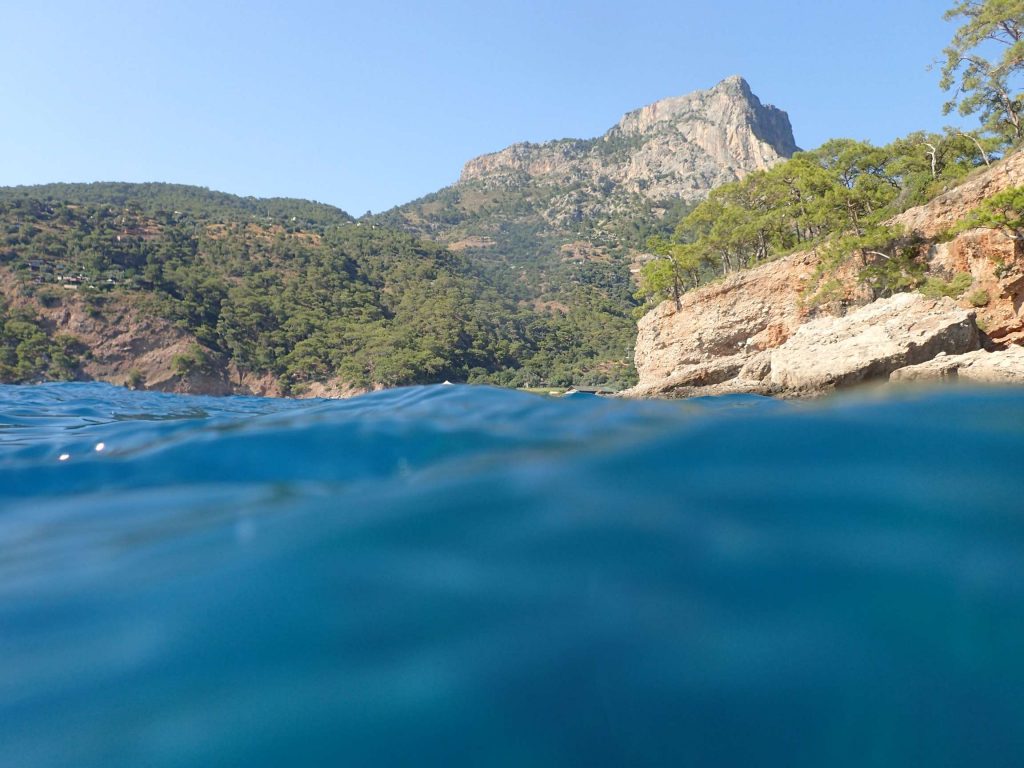
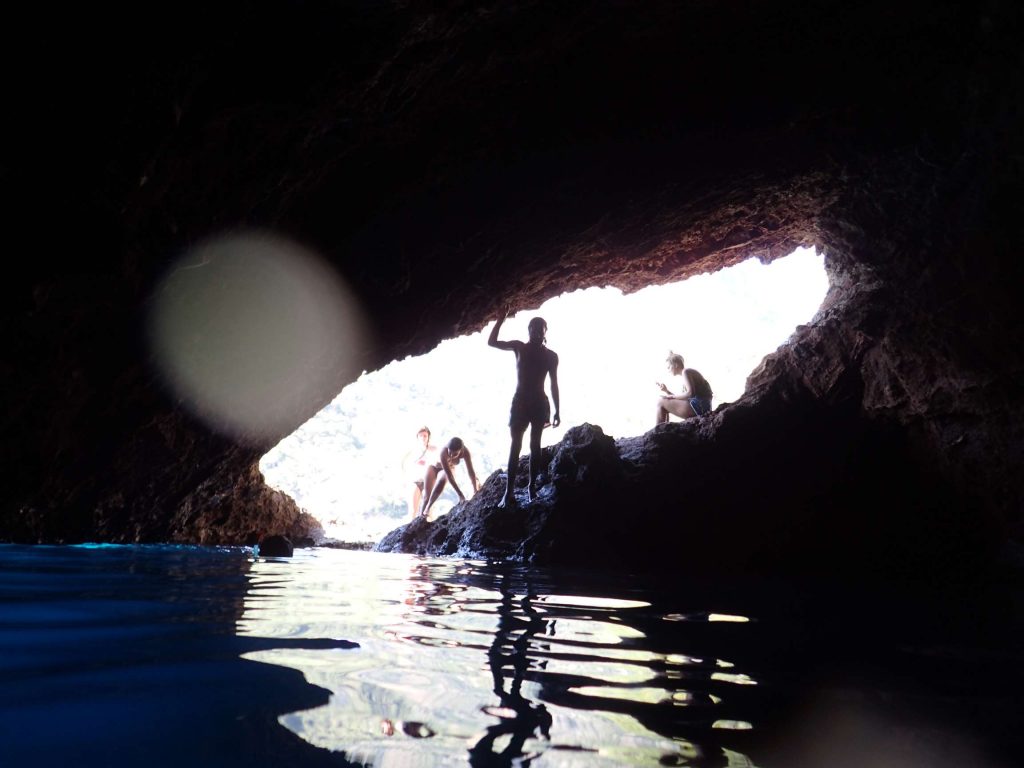
Already, my memories of Kabak begin to blur together into a sunny mess of sand, saltwater, and plenty of beers. One morning I met a group of Turkish friends from Istanbul who were in Kabak for a holiday, I drank a few beers with them and we hung out for most of the next few days.
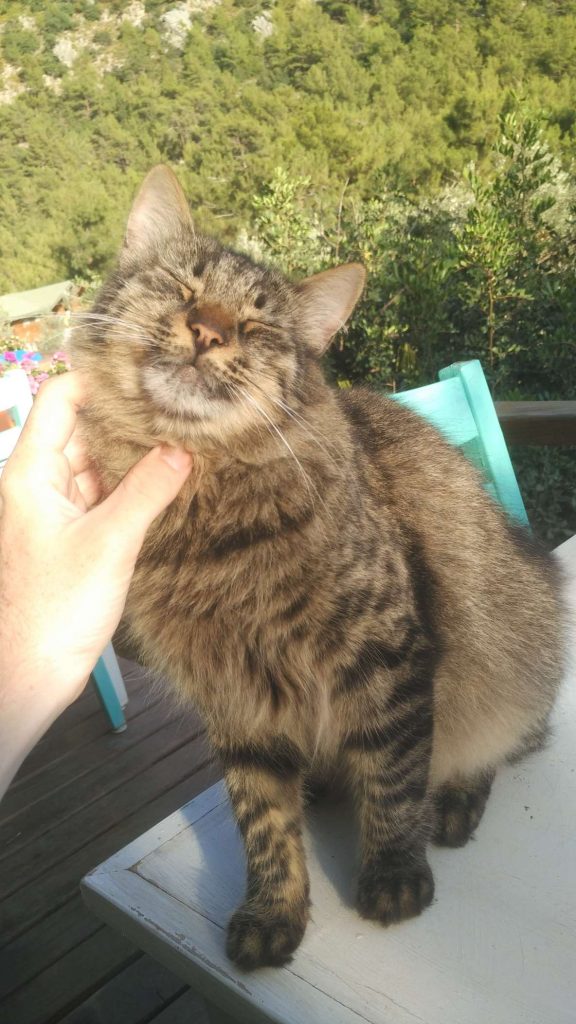
Here, lounging on the beach in the past, I’ll leave you until next time,
– Alex
[I’m currently in Istanbul, writing this from ten days in the future. I’ll do my best to make sure the next few blog posts come faster]
This entry was posted in Daily, Turkey